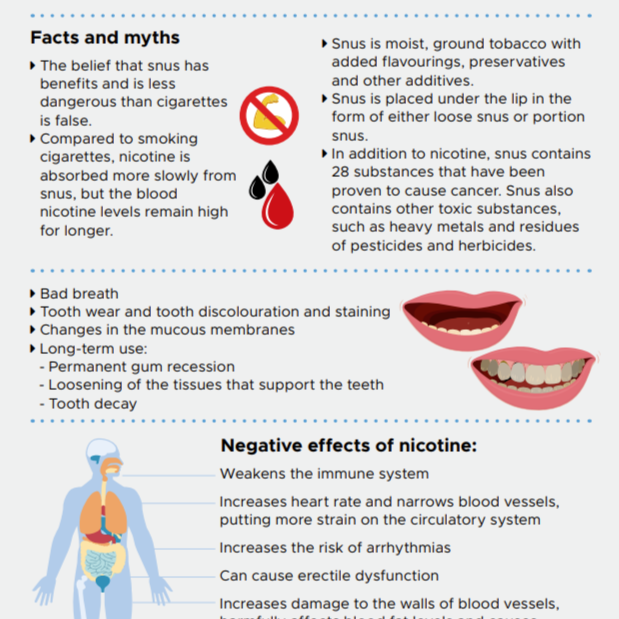Snus contains nicotine which causes a strong addiction. Users of snus usually get 3–5 times more nicotine than smokers.
The effects of snus are most visible in the oral cavity and the throat. To slow down the development of lesions, change where you keep the snus in your mouth. It’s also important to see the dentist regularly.
Typical consequences of using snus include:
- nicotine addiction
- bad breath
- tooth wear and tooth discolouration and staining
- damage to gums
- oral, throat and nose cancers
- cardiovascular diseases
- type 2 diabetes
- problems during pregnancy.
To cut down on snus, you can:
- Keep the snus out of your sight.
- Switch to a different brand of snus.
- Keep the snus in your mouth for a shorter period of time.
- Reduce the number of snus portions.
- Take smaller portions of snus.
Related content
- Overcoming nicotine addiction
- The path to quitting: the change begins
- The path to quitting: not smoking becomes an everyday thing
- E-cigarettes and nicotine addiction
- Nicotine and surgery
Other topics that may interest you
Snus, nicotine and sports
Nicotine affects the whole body and has harmful effects on many organs that play a central role in physical performance.
- Nicotine causes the blood vessels to narrow and increases heart rate, putting more strain on the circulatory system and reducing exercise tolerance. Endurance athletes in particular can experience lower physical endurance.
- Chronic inflammation in the body weakens tolerance to physical stress and increases the risk of infections. Wounds and fractures may heal more slowly.
- Tissues receive insulin more slowly and less, which can affect glucose metabolism negatively.
- Pulmonary circulation is weakened as the blood vessels become narrower.
Nicotine is not classified as a doping substance because it does not improve performance. Many sports associations prohibit the use of snus in their competitions.
Contents of snus
Snus can contain many times more nicotine than cigarettes. Snus usually contains about 7–8 mg/g of nicotine, but the strongest snus brands can contain up to 45 mg/g of nicotine.
Snus contains more than 2,500 chemicals, 28 of which are carcinogenic.
Snus also contains cadmium, lead, arsenic, and radioactive substances.
Sale and purchase of snus
The sale of snus is prohibited in all EU countries except Sweden.
According to the Finnish Tobacco Act, private persons may import a maximum of 1,000 grams of tobacco products (snus, nasal snuff, chewing tobacco) in one day for their personal use.
It is prohibited by law to import snus for the use of another person, regardless of whether this person pays for the product or not.
Persons under the age of 18 are not allowed to import tobacco products or nicotine-containing e-liquids.

30 facts about snus
In addition to nicotine, snus contains 28 substances that have been proven to cause cancer.